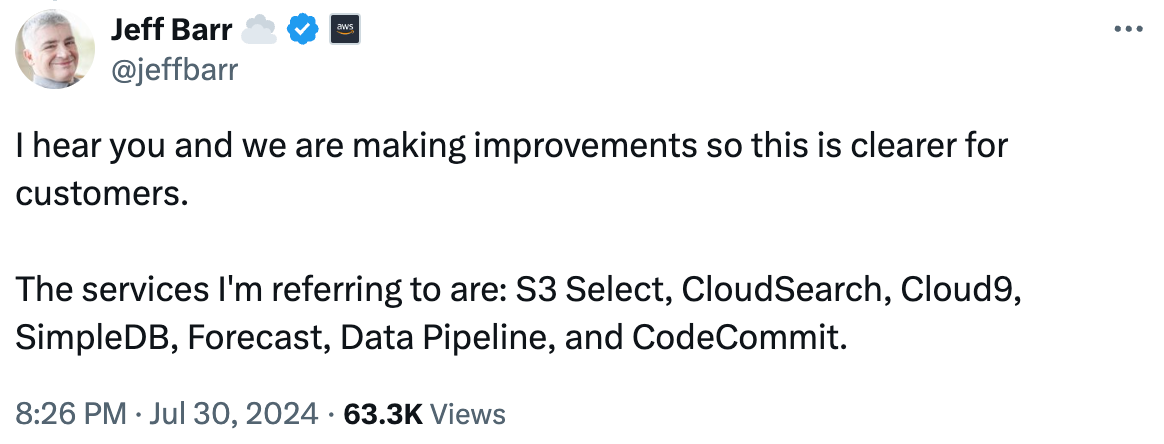AWS deprecations
My thoughts and what it means for you
👋 Hi, this is Daniel with my second issue of the year. I’ve been away a long time, but I’m back! I recently left my role at Amazon Web Services on the Amazon CodeCatalyst team to join Airbnb as a software engineer! I wasn’t able to write as much during this transition because I was interviewing/prepping for interviews (click here for tips on how) but that’s done now. I look forward to writing much more often now!
In the past few weeks, a number of X (formerly known as Twitter) users in the tech community discovered that some AWS services are being deprecated (or something, it’s not entirely consistent or clear). These services are identified by Jeff Barr in the following Tweet (or post or whatever it is now):

Additionally, my understanding is the QLDB (not mentioned) is also deprecated.
Of this list, most of the deprecations make sense. I’ll go through each one with my thoughts. Note that even with my recent employment at AWS, I don’t really have any inside info on this. These are my own thoughts.
Why is AWS deprecating services?
The leaders at AWS must believe that they can discontinue these (I assume unprofitable) services without losing customer trust. For each of these services, one of more of the following is likely true:
not many customers use it
the customers have other options that are relatively straightforward to migrate with minimal financial impact (or they are allowed to stay)
CodeCommit
CodeCommit is inferior to alternatives like GitLab, BitBucket and GitHub. At some point in the distant past, AWS chose not to make CodeCommit a competitive service compared to these other Git providers. So, deprecation (or whatever this is) makes sense to me. Interestingly, I have friends who work for government companies and contractors that use CodeCommit extensively in AWS GovCloud. I am curious to see how that will play out. I’m betting that CodeCommit will continue to exist in GovCloud pretty much indefinitely.
Data Pipeline
I’ll admit I’m not super familiar with Data Pipeline. I’ve used it in the past to back up DyanmoDB tables, but that use case is no longer necessary as DDB natively supports backups. If I wanted to perform ETL using native services today, I would NOT involve data pipeline. Instead, I would use modern (and Serverless) services like Glue, S3 and Lambda (and potentially step functions). So, this deprecation makes sense to me. It does seem like the kind of thing though that if a company was using Data Pipeline, migration off of it might not be very straightforward.
ForeCast
What is ForeCast? I vaguely recall it being announced. I have no idea whether this service deserves to be deprecated or not because I know nothing about it.
SimpleDB
SimpleDB is inferior to DynamoDB which has replaced it. SimpleDB customers should be able to move to DynamoDB. It is interesting that Jeff had this in the list. My understanding is that “new signups” for SimpleDB have been discontinued for a very long time.
Cloud9
At some point in the past, AWS must have decided it did not want to seriously compete with Visual Studio Code. So, the deprecation of Cloud9 makes sense with that in mind. That said, customers of this product liked it a lot. I’m sure it will be sad for them to see it go.
CloudSearch
I don’t think I’ve ever heard of anyone using CloudSearch. I think what customers really want is a Serverless search service. OpenSearch supposedly has that, but I don’t consider a service to be truly Serverless unless it scales to $0 when not being used. Think of things like an empty DynamoDB table or an empty S3 bucket.
QLDB
Again, this is a service I don’t understand. How can there be a crypto service? I thought the whole point of crypto was decentralization? Unlike the other services, it sounds like AWS plans to actually delete the data in this services. That tells me there are very few customers using it.
S3 Select
Of every service mentioned, S3 Select is the biggest surprise. S3 itself is a service that will outlive everyone reading this, so it’s odd seeing a feature of it being discontinued. That said, I don’t think much is lost here because AWS Athena is in every a way a more powerful service that can do everything S3 Select could do and much more (correct me if I’m wrong). I’m honestly shocked that the implementation of S3 Select isn’t just Athena on the backend.
I guess that S3 Select works without much configuration whereas Athena requires some configuration to be setup. So at most, this will just annoy the few people that were using it.
What do AWS Deprecations mean for me?
These deprecations mean that AWS services that are unprofitable for AWS or lack users or meet whatever criteria AWS sets aren’t guaranteed to be around forever. It means that any shiny new service announced at re:invent might not be all that it is marketed to be. QLDB was announced at re:invent 2019. AWS Forecast went GA in 2019 as well. S3 Select went GA late in 2018. These services aren’t really all that old, but AWS doesn’t feel the need to continue with them. We can expect more deprecations to be announced in the future, even for products being released in 2024 and beyond.
Hopefully these deprecations lead new product teams at AWS to be more careful about what products are being built.

